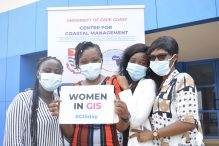Call for Proposals for the Unit of Competence in Digital Education (U-CoDE) Initiative
Objectives and Action Plan
The Africa Higher Education Centers of Excellence for Development Impact (ACE Impact) Projects in collaboration with the EPFL – École polytechnique fédérale de Lausanne (Switzerland) are launching the Call for Proposals for the Center of Competence in Digital Education (C-CoDE) Initiative (Deadline for submission of proposals 25 June 2021). This Pilot initiative aims to promote the sustainable integration of digital education in the teaching process in selected ACE Impact host universities, as a means to strengthen the quality of teaching as well as the competencies of graduates.
The participating institutions will be provided with the necessary training and coaching to transform their educational curricula by integrating modern digital education methods. As a Pilot, the initiative will launch in six (6) ACE Impact host institutions in 2021. The key element at each institution will be the creation and the development of a C-CoDE (see the attached Powerpoint for further details on the initiative).
By encouraging the use of innovative digital technologies in educational practices, the aim is to strengthen the techno-pedagogical skills of lecturers and to train them in the production of digital content and its use in university courses.
The initiative will proceed in two steps, to:
- Enable the participating university to acquire the necessary skills, infrastructure, capacity and quality standards to operate a C-CoDE serving the institution. Such a Center will contribute to the design, production and dissemination of Massive Open Online Courses (MOOCs) and Open Educational Resources (OER). The faculty of the institution will also be trained in the integration of ICT-enabled teaching methods.
- Extend the Center’s sphere of activity to serve other African institutions (using a training-the-trainers model), for example within the broader ACE Impact project portfolio and beyond – across the Sub-Saharan Africa (SSA) region.
AAU, as the regional facilitation unit, through its grant under ACE Impact is bearing the delivery, coaching and out-of pocket costs of the experts providing the training to the more than 200 participants from the 6 ACE Impact host institutions for the entire pilot period. EPFL, through its Center of Excellence in Africa (EXAF), is providing the content and training methodology.
For this initiative to have long-term institutional impact and to be transformative, the institutions participating in the Pilot, will commit to:
- Deploy digital education capabilities in its institution (a C-CoDE) and integrate the use of the resources produced by the C-CoDE in their educational programmes
- Encourage the pooling and sharing of digital educational resources – at the institution, within the ACE Impact project portfolio, and across the SSA region and beyond
- Boost the development of new teaching practices by motivating and supporting the lecturers engaged in this initiative, at first within the participating institution and then more broadly.
- The following additional conditions:
- Appoint a C-CoDE Project Leader, an Academic Coordinator and a Technical Coordinator (see the Local Coordination Team template for a description of the profile of each of these appointees)
- Appoint 1 Techno-pedagogical Engineer to serve as the point of reference for digital education projects
- Appoint 2 Technicians – one specialized in multimedia acquisition and post-production, and one specialized in IT and LMS
- Nominate 3 Techno-pedagogical Specialists – faculty members who will receive extensive training as part of the initiative and will support subsequent training activities on campus
- Nominate 30 faculty members who will participate in the training and appoint 3 of them who will be trained to coach their peers (15% of their time)
- Building space to install the C-CoDE (min. 100m2)
- Financial investment of approximately $100,000 to cover travel; accommodation; multimedia and IT equipment; refurbishment and adaptation of premises to install the C-CoDE
Please note that beyond a strong commitment from the university management and a strong technical proposal, preference will be given to universities that prioritize female and junior faculty members when nominating the 30 faculty members to be trained. The performance of the related Centers within the ACE Impact Project will also be highly considered.








